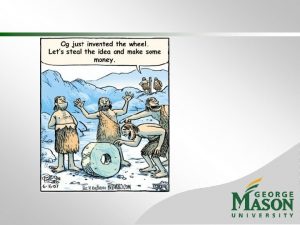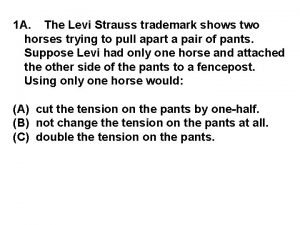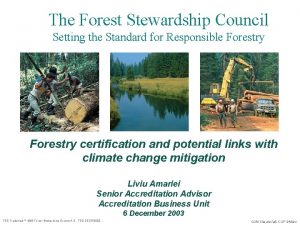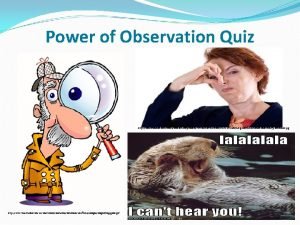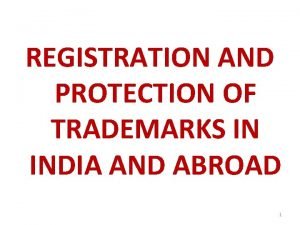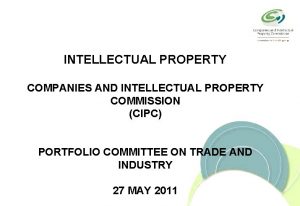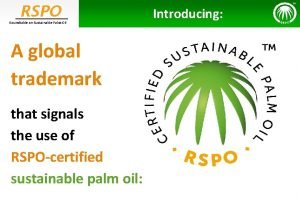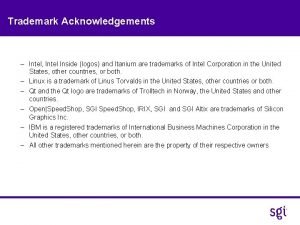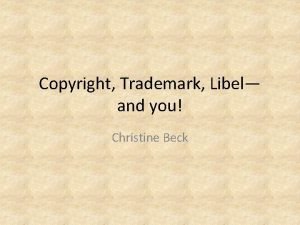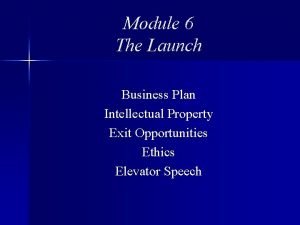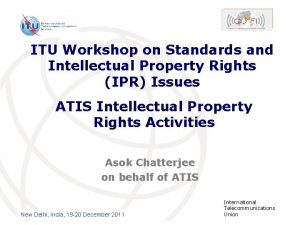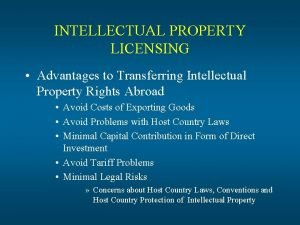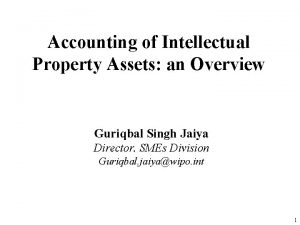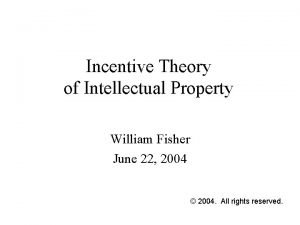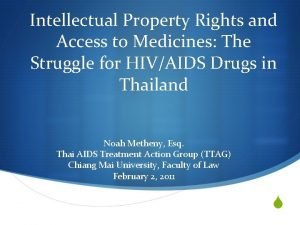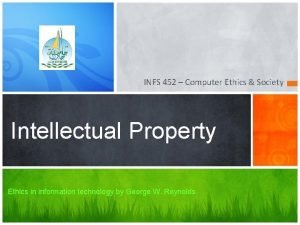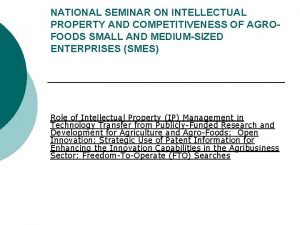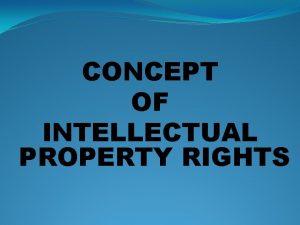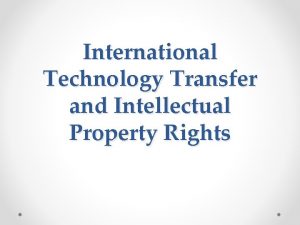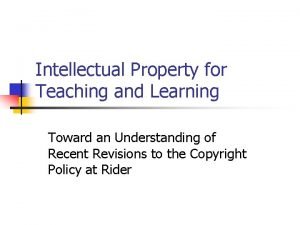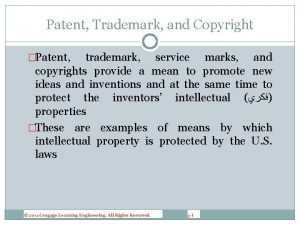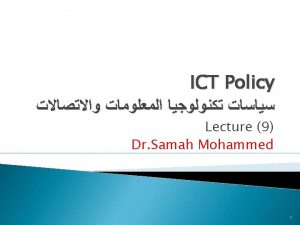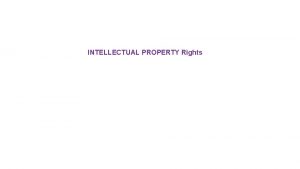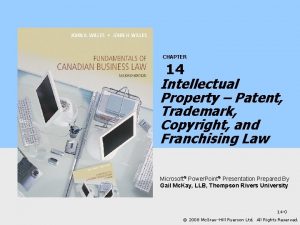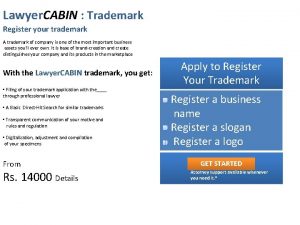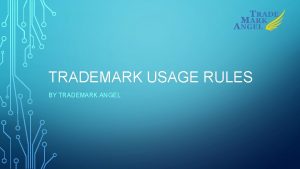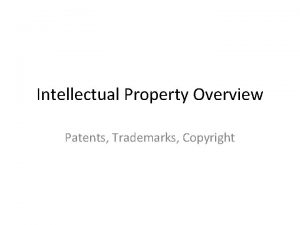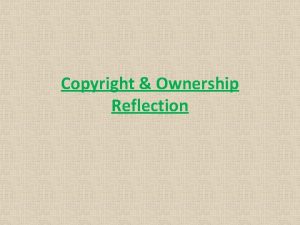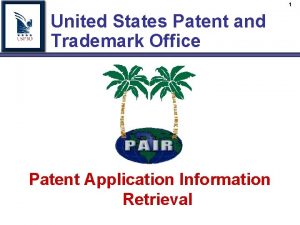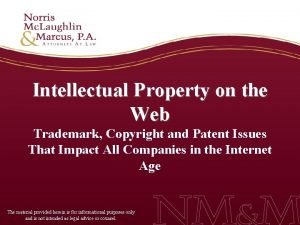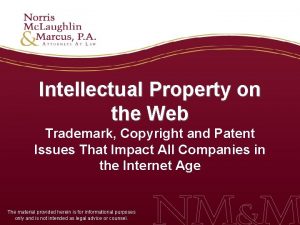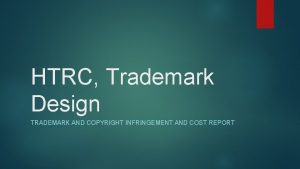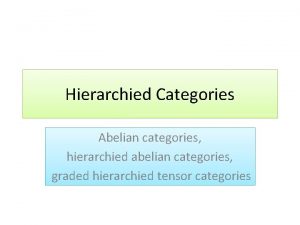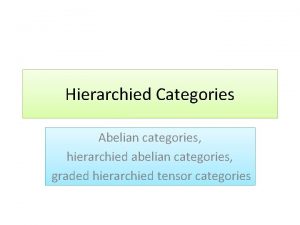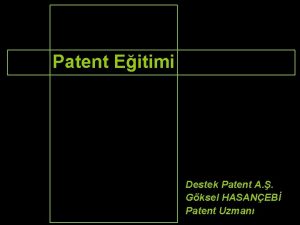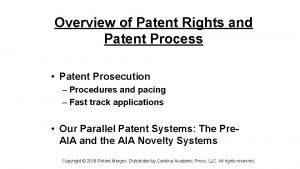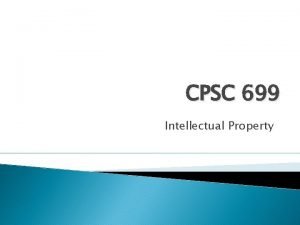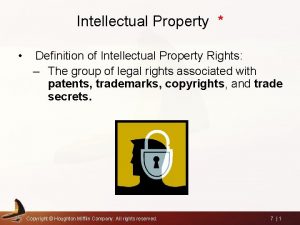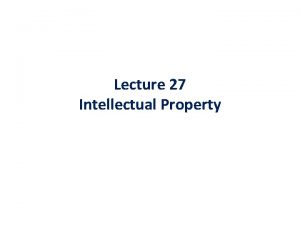Intellectual Property 3 Categories Patent Trademark Copyright Intellectual



























- Slides: 27

Intellectual Property • 3 Categories – Patent – Trademark – Copyright

Intellectual Property • Patent – A grant made by the government to the inventor conveying the exclusive right to make, use and sell the invention for a term of 20 years.

Intellectual Property • Trademark – A distinctive mark of authenticity (such as a word, name or symbol) through which the products of manufacturers may be distinguished from those of others. 10 -year term; renewable indefinitely.

Intellectual Property • Copyright – a right granted by statute to the author or originator of certain literary or artistic productions, whereby that person has the exclusive privilege of multiplying, publishing and selling them. Term: Life of the author plus 70 years.

Copyright • Congress has amended the copyright law from time to accommodate new technology. • First U. S. Copyright legislation -- 1790. • Comprehensive revisions to the law --1909 and 1976

Copyright • Copyright protection extends to: – Original works of authorship fixed in any tangible medium of expression. . – Generally, slightest amount of originality confers protection under the law. • Neither artistic merit nor novelty required.

Copyright • “Fixed” requirement is easily met if it is embodied in a medium sufficiently permanent or stable to permit it to be perceived, reproduced or otherwise communicated.

Copyright • 8 types of works of authorship are protected: – 1. Literary works – 2. Musical works, including accompanying words. – 3. Dramatic works, including accompanying music. – 4. Pantomimes and Choreographic works.

Copyright – 5. Pictorial, graphic and sculptural works. – 6. Motion pictures and other audiovisual works. – 7. Sound recordings. – 8. Architectural works.

Copyright • The Copyright Act recognizes 6 exclusive rights of the copyright owner: – 1. Reproduction. – 2. Preparation of derivative works. – 3. Public distribution. – 4. Public performance. – 5. Public display. – 6. Public digital performance of a sound recording.

Copyright Formalities Copyright Extension Act of 1998 • Duration: Life of the author, plus 70 years for all works created on or after Jan. 1, 1978. • Old term: Life of the author, plus 50 years. • For company held copyrights: 120 years from date of creation or 95 years from date of publication, whichever is shorter.

Copyright Formalities • Notice – copyright symbol. Required in ‘ 76 Act, but changed with 1989 Berne Convention Implementation Act. Now optional but welladvised, especially in connection with online works.

Copyright Formalities • Registration – the Copyright Act strongly encourages registration. • No action (lawsuit) for infringement can be maintained unless the subject work is registered. – Note that registration could be done after the infringing activity and prior to filing the suit. But the plaintiff cannot claim attorney’s fees or statutory damages.

Copyright • The Certificate of Registration, if obtained in a timely fashion (w/in 5 years of creation), constitutes prima facie evidence of the validity of the copyright. • Even a late registration of a copyright may serve as effective evidence of copyright ownership.

Copyright Formalities • How to register your copyright: • 1. Complete and submit an application to the Copyright Office. • 2. Pay the application fee. ($30) • 3. Deposit copies of the work.

Copyright Formalities Suit for infringement Plaintiff must prove: 1. Ownership of a copyright for the work. 2. That the defendant violated one or more exclusive rights, such as unauthorized copying… A. Access B. Substantial Similarity

Copyright--Specialized Works • The Copyright Act provides for protection for Collective Works-- created from the assembly of other works. • Examples: anthologies, magazines, and ads (must have permission of individual copyright holders) newspapers.

Copyright--Fair Use • Fair Use is a limitation on the exclusive rights of the copyright owner. – It is not an infringement to use a copyrighted work for purposes such as criticism, comment, news reporting, teaching (includes copies for the class), scholarship or research.

Copyright--Fair Use • Fair use is determined by analyzing four factors: • 1. The purpose and character of the use. • 2. The nature of the copyrighted work. • 3. The amount of the work. • 4. The effect of use on the potential market.

Copyright • Campbell v. Acuff-Rose Music (1994) – Is Campbell’s use considered a fair use? – Analyze the 4 factors…

Copyright • Works Made for Hire (two types): • 1. A work prepared by an employee within the scope of employment. • 2. A work specially ordered or commissioned for a collective work if a work-for-hire agreement is signed.

Copyright--Freelancers • Freelancers: – Writers, musicians or artists who are not under full-time work contracts but whose writings or services are sold to individual publishers.

Copyright--Freelancers • • • Some rights publishers might buy: 1. All rights 2. First serial rights 3. First North American serial rights 4. Simultaneous rights 5. One-time rights

Copyright--Freelancers • Common Practice: – Publisher buys all rights to an article or photographs but agrees to reassign the rights to the creator after publication.

Copyright--Remedies • Injunctive relief--includes preliminary and permanent injunctions • Preliminary may be granted on proof of valid copyright and the infringement. • Monetary Awards--3 categories: • 1. damages • 2. profits • 3. statutory damages

Copyright--Remedies • Statutory damages: – minimum: $250 and maximum $10, 000, according to what the court finds “just. ” – court can award up to $50, 000 if infringement is found to be willful. • (essentially punitive damages)

Copyright--Remedies • Criminal penalties – infringement qualify as a federal misdemeanor… up to $10, 000 in fines and a year in prison. – Prosecutions have been infrequent.
 Trademark and trade secret
Trademark and trade secret The levi strauss trademark shows two horses
The levi strauss trademark shows two horses Fsc trademark
Fsc trademark On which playing card is the cardmaker's trademark
On which playing card is the cardmaker's trademark Features of trademark
Features of trademark Boeing trademark
Boeing trademark Cipc trademark classes
Cipc trademark classes Rspo trademark license
Rspo trademark license Intel inside logos
Intel inside logos Trademark
Trademark Intellectual property business plan example
Intellectual property business plan example Trade related aspects of intellectual property rights
Trade related aspects of intellectual property rights At&t intellectual property
At&t intellectual property Intellectual property rights
Intellectual property rights Intellectual property business plan
Intellectual property business plan Advantages of intellectual property
Advantages of intellectual property Intangible inputs
Intangible inputs Theories of intellectual property william fisher
Theories of intellectual property william fisher Intellectual property in professional practices
Intellectual property in professional practices Intellectual property rights
Intellectual property rights Property
Property Evalueserve patent search
Evalueserve patent search Intellectual property
Intellectual property Concept of intellectual property
Concept of intellectual property Importance of intellectual property
Importance of intellectual property Characteristics of intellectual property
Characteristics of intellectual property Right to intellectual property of teachers
Right to intellectual property of teachers Discuss intellectual property frankly
Discuss intellectual property frankly
